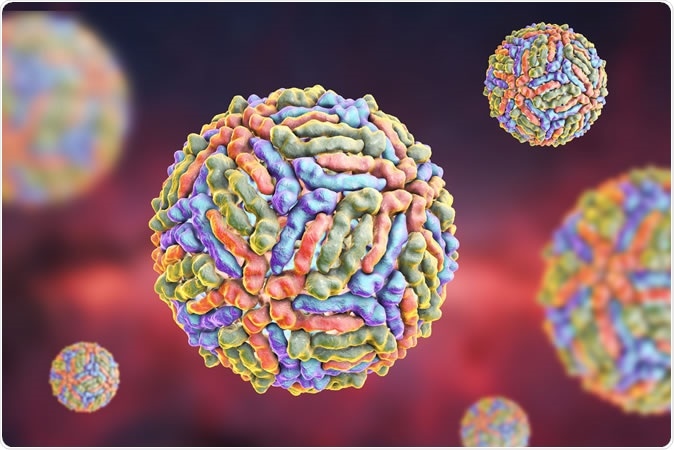A research team has discovered a protein without which cells infected by viruses cannot trigger an immune response, leading to 100% mortality with even non-disease-producing strains. The discovery of the new Z-DNA binding protein, or ZBP1, was reported in the journal Frontiers in Microbiology. It could help develop new treatment methods for viruses that target the nervous system such as the Zika or West Nile Encephalitis virus.

West Nile virus (WNV), 3D illustration Credit: Kateryna Kon / Shutterstock
The research
The study focused on how to control the replication of 2 modern-day killer viruses, the West Nile and Zika viruses. They found a cytoplasmic sensor protein, ZBP1, which is essential in recognizing the presence of a virus by the accumulation of RNA in response to the infection. ZBP1 then signals the virus-infected cell to enter a specialized cell death program called necroptosis – a virus-induced lysis of the cell membrane that results in cell death. By killing off the infected host cell, this short-circuits the normal viral program of hijacking the host cell’s machinery to create numerous viral copies, assemble them and release them to infect new host cells. By inhibiting viral replication, ZBP1 signaling provides precious time to the body to create antibodies and clear the virus from the host. Prior research by the same scientists has shown the steep rise in ZBP1 expression in mouse brains and mouse cells following viral infection.
When ZBP1 signaling is turned off, or absent, on the other hand, as in knockout mice, the study found even when they were infected by a strain of West Nile virus that was engineered to not produce disease (a non-pathogenic strain), every single mouse died. They also showed high viral loads in the brain and the blood, and the levels of inflammatory markers such as interferon (IFN)-α were significantly increased. This seems to indicate that ZBP1 restriction of West Nile infection doesn’t involve these inflammatory cytokines.
Viral replication was much higher in brain cells and embryonic fibroblasts from mice without ZBP1 expression after infecting with either pathogenic or nonpathogenic strains of West Nile virus, as well as of Zika virus.
When one copy was deleted, the rate of infection and death was higher than with both copies of the gene intact. On the other hand, an active ZBP1 pathway led to limited replication, and prevented the development of brain inflammation in mice infected with the West Nile virus. The study thus shows that ZBP1 is required to limit the replication of West Nile and Zika viruses, and that this pathway is essential in activating effective immune responses to West Nile virus infection in mice.
Researcher Mukesh Kumar says, “It's significant because you take a virus that has never been shown to kill anything and if you block this protein the virus will just kill everything.”
West Nile virus
The most common cause of viral encephalitis in the US is the mosquito-borne illness caused by the West Nile virus. More than 50,000 people have been affected so far, since the first case was reported in 1999, and over 2300 have died. It is carried by the common Culex species of mosquito, which is widespread in a range of regions.
Zika virus
The Zika virus is spread by the Aedes mosquito which can breed in the south of the US, up to Florida and Texas. It can affect the nervous system to cause severe illness like the paralyzing condition called Guillain-Barre syndrome, in which the host mounts an autoimmune attack on its own nerves. In pregnant women, it can also cause birth defects such as microcephaly, in which babies are born with very small heads due to the failure of normal brain development.
Importance of ZBP1 in viral encephalitis
In the majority of cases of Zika or West Nile virus attack, the person doesn’t even know because of a healthy immune response, and this limits our knowledge of actual infection statistics and of the natural course of infection.
Of reported cases, almost half affect the nervous system and cause brain inflammation (encephalitis) or similarly serious, fatal or crippling manifestations. Antiviral treatments do not typically work well in cases of encephalitis. While some treatment strategies may focus on letting down the blood-brain barrier that blocks the entry of many molecules to the brain to allow the antiviral drug to have access to infected brain tissue, this could be counterproductive by allowing the virus to enter as well, fear the researchers.
It is in such situations that the current research may prove its value by preventing the virus from reaching the brain. Hopefully, by increasing the level of ZBP1 protein production in the brain, by enhancing the expression of the ZBP1 genes, the virus will be eliminated from the brain and encephalitis will not occur following infection.
Kumar explains: “If you try to open barriers to the brain you may be making it worse. That's why we try to modulate some part of the host immune response. Manipulating a host protein already inside the genome to trigger the body's natural immune response is a better way of fighting viruses already in the brain.”
The team looks ahead to the potential of the finding to point new directions for research into treatment of viruses that are neurotropic, or target the nerves. They are already planning to explore the role of the protein in some of these organisms, such as Eastern Equine Encephalitis and Powassan virus.
Journal reference:
Z-DNA-Binding Protein 1 Is critical for controlling virus replication and survival in West Nile virus encephalitis. Hussin A. Rothan, Komal Arora, Janhavi P. Natekar, Philip G. Strate, Margo A. Brinton and Mukesh Kumar. Frontiers in Microbiology, 11 September 2019. https://doi.org/10.3389/fmicb.2019.02089. https://www.frontiersin.org/articles/10.3389/fmicb.2019.02089/full